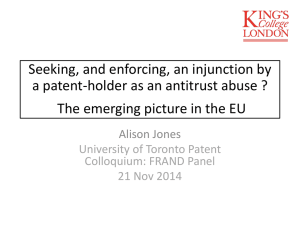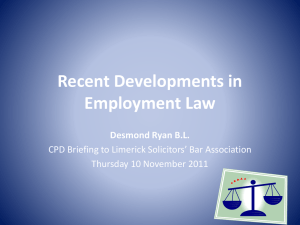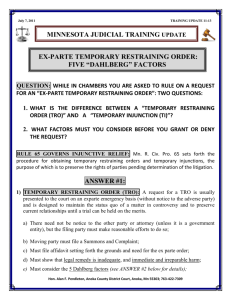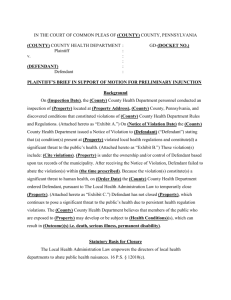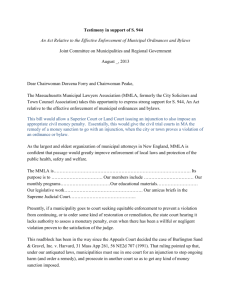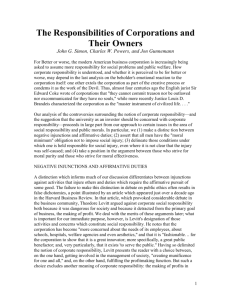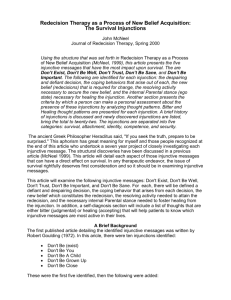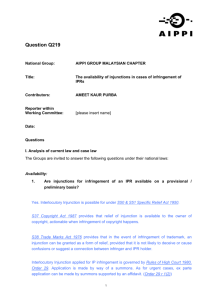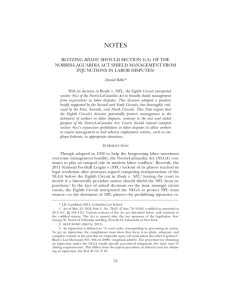TOPIC 10: INJUNCTIONS AND FAMILY VIOLENCE ORDERS
advertisement
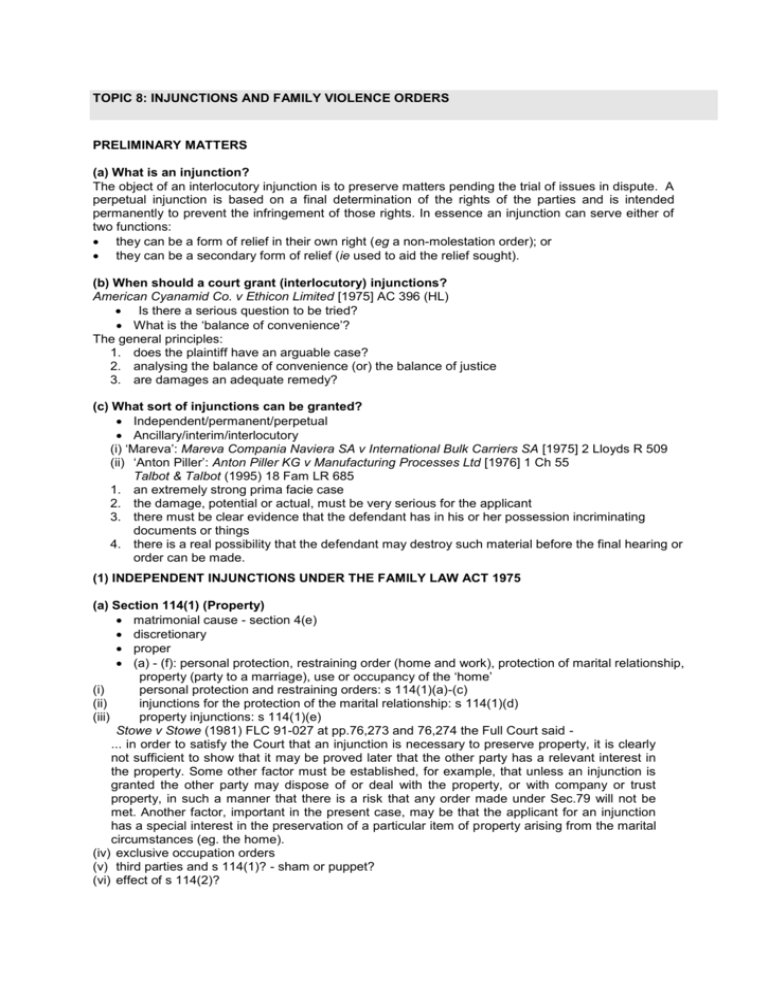
TOPIC 8: INJUNCTIONS AND FAMILY VIOLENCE ORDERS PRELIMINARY MATTERS (a) What is an injunction? The object of an interlocutory injunction is to preserve matters pending the trial of issues in dispute. A perpetual injunction is based on a final determination of the rights of the parties and is intended permanently to prevent the infringement of those rights. In essence an injunction can serve either of two functions: they can be a form of relief in their own right (eg a non-molestation order); or they can be a secondary form of relief (ie used to aid the relief sought). (b) When should a court grant (interlocutory) injunctions? American Cyanamid Co. v Ethicon Limited [1975] AC 396 (HL) Is there a serious question to be tried? What is the ‘balance of convenience’? The general principles: 1. does the plaintiff have an arguable case? 2. analysing the balance of convenience (or) the balance of justice 3. are damages an adequate remedy? (c) What sort of injunctions can be granted? Independent/permanent/perpetual Ancillary/interim/interlocutory (i) ‘Mareva’: Mareva Compania Naviera SA v International Bulk Carriers SA [1975] 2 Lloyds R 509 (ii) ‘Anton Piller’: Anton Piller KG v Manufacturing Processes Ltd [1976] 1 Ch 55 Talbot & Talbot (1995) 18 Fam LR 685 1. an extremely strong prima facie case 2. the damage, potential or actual, must be very serious for the applicant 3. there must be clear evidence that the defendant has in his or her possession incriminating documents or things 4. there is a real possibility that the defendant may destroy such material before the final hearing or order can be made. (1) INDEPENDENT INJUNCTIONS UNDER THE FAMILY LAW ACT 1975 (a) Section 114(1) (Property) matrimonial cause - section 4(e) discretionary proper (a) - (f): personal protection, restraining order (home and work), protection of marital relationship, property (party to a marriage), use or occupancy of the ‘home’ (i) personal protection and restraining orders: s 114(1)(a)-(c) (ii) injunctions for the protection of the marital relationship: s 114(1)(d) (iii) property injunctions: s 114(1)(e) Stowe v Stowe (1981) FLC 91-027 at pp.76,273 and 76,274 the Full Court said ... in order to satisfy the Court that an injunction is necessary to preserve property, it is clearly not sufficient to show that it may be proved later that the other party has a relevant interest in the property. Some other factor must be established, for example, that unless an injunction is granted the other party may dispose of or deal with the property, or with company or trust property, in such a manner that there is a risk that any order made under Sec.79 will not be met. Another factor, important in the present case, may be that the applicant for an injunction has a special interest in the preservation of a particular item of property arising from the marital circumstances (eg. the home). (iv) exclusive occupation orders (v) third parties and s 114(1)? - sham or puppet? (vi) effect of s 114(2)? Exclusive Occupation Davis and Davis [1976] FLC 90-062 Page and Page [1981] FLC 91-025 Re Dovey; Ex parte Ross (1979) 141 CLR 526 Stowe and Stowe [1981] FLC 91-027 Davis and Davis [1983] FLC 91-319 Mullane v Mullane (1983) 158 CLR 436 Injunction re non-disclosure Gibb and Gibb [1979] FLC 90-694 Parenting injunctions F and F [1989] FLC 92-032 Flanagan and Handcock [2001] FLC 93-074. See topic 5 Ancillary injunctions Sieling and Sieling [1979] FLC 90-627 Injunctions to preserve assets When thinking of applying for an injunction to protect assets consider the following: 1 is there an actual or potential claim under the FLA? 2 Is there objective evidence of a disposition, an intention to dispose or a risk of disposal by the respondent 3 Is there a risk that the disposition is likely to defeat any anticipated order in favour of the applicant in substantive proceedings? 4 Do the injunctions sought extend beyond that which is necessary to protect the substantive claim of the applicant? Waugh (2000) FLC 93-052 Full Court “ ... whether the injunctions ... were necessary, and went no further than necessary, to prevent abuse or frustration of the court’s process in relation to the matter within its jurisdiction ...” Mullen and De Bry (2006) FLC 93-293 Waugh did not set a threshold question as where a scheme to defeat judgment exists. What the trial judge in Waugh failed to do was to consider whether there was any evidence of any intention by the husband to dispose of any assets pursuant to any scheme to defeat any judgment. What Waugh said was that the trial judge took a fundamentally flawed approach. Ought to have addressed question of whether there was evidence of any intention as part of an enquiry into the risk of disposal of assets to defeat judgment. The Full Court discussed the principles to be applied. The power in s114(3) the court may grant an injunction in any case where it is just or convenient to do it. Each case will involve an assessment of a number of factors. Injunctions and 3rd parties Ascot Investments Pty Ltd v Harper (1981) 148 CLR 337 Re Ross-Jones; ex parte Green [1984] 156 CLR 185 Blueseas Investments Pty Ltd v Mitchell and McGillivray [1999] FLC 92-856 Impact of Pt VIIIAA? 90AF(1) - in proceedings under s 114 court may: make an order restraining a person from repossessing property of a party to a marriage; or grant an injunction restraining a person from commencing legal proceedings against a party to a marriage. 90AF(2) - in proceedings under s 114, court may make any other order, or grant any other injunction that: directs a third party to do a thing in relation to the property of a party to the marriage; or alters the rights, liabilities or property interests of a third party in relation to the marriage. 90AF(3) - court may only make an order or grant an injunction under 90AE(1)/(2) if: making of order, or granting of injunction, is reasonably necessary etc to effect a division of property between the parties to the marriage if order or injunction concerns a debt of a party to the marriage - it is not foreseeable at time order made, or the injunction granted, that to make the order/grant the injunction would result in the debt not being paid in full third party has been accorded procedural fairness in relation to the making of the order or injunction for an injunction/order under s 114(1) - court is satisfied that, in all the circumstances, it is proper to make the order/grant injunction for an injunction under s 114(3) - court is satisfied that, in all the circumstances, it is just or convenient to grant injunction court is satisfied that order or injunction takes into account the matters mentioned in subsection (4). 90AF(4) - the matters are as follows: taxation effect (if any) of the order/injunction on the parties to the marriage the taxation effect (if any) of the order/injunction on the third party social security effect (if any) of the order/injunction on the parties to the marriage third party's administrative costs in relation to the order/injunction if order/injunction concerns a debt of a party to the marriage - the capacity of a party to the marriage to repay the debt after the order is made/injunction granted Example: The capacity of a party to the marriage to repay the debt would be affected by that party's ability to repay the debt without undue hardship. economic, legal or other capacity of third party to comply with the order/injunction Example: The legal capacity of the third party to comply with the order or injunction could be affected by the terms of a trust deed. However, after taking the third party's legal capacity into account, the court may make the order or grant the injunction despite the terms of the trust deed. If the court does so, the order or injunction will have effect despite those terms (see section 90AC). if, as a result of the third party being accorded procedural fairness in relation to the making of the order/granting of injunction, the third party raises any other matters - those matters any other matter that the court considers relevant. (b) Section 68B(1) - Children must be a child power is discretionary proper for child’s welfare including (but not limited to) paras (a) - (d) - personal protection of the child/adult carer or restraining order in respect of the child/adult carer (2) ANCILLARY INJUNCTIONS UNDER THE FAMILY LAW ACT 1975 (a) Section 114(3) - Property proceedings outside s 114(1) discretionary interlocutory or otherwise just and convenient unconditionally or conditionally (b) Section 68B(2) - Children must be a child power is discretionary interlocutory or other must be just or convenient to make the order NOTE: s 68B(3) states that the injunction under this section can be unconditional or “on such terms or conditions as the court considers appropriate” (3) INJUNCTIONS UNDER THE PROPERTY (RELATIONSHIPS) ACT 1984 (a) Property injunctions: s 38(1)(h) note Part III ‘jurisdictional hurdles’ protect etc. property/financial resources and/or aid enforcement (b) Other Part III injunctions: s 38(1)(k) again note Part III ‘jurisdictional hurdles’ “make any other order or make any other injunction ... which it thinks necessary to make to do justice” (c) Personal protection: s 53 ss 4/5 definition only (no additional ‘hurdles’) personal protection restraining order (residence/specified area/place of work/child’s place of work) use/occupancy of home Seminara v Ferguson (1993) 16 Fam LR 410 (4) APPREHENDED DOMESTIC VIOLENCE LAWS UNDER STATE LAW Links: www.lawlink.nsw.gov.au/lc.nsf/pages/avo_index www.lawlink.nsw.gov.au/lawlink/vaw/dvguidelines.nsf/pages/whatis (violence against women special unit) http://www.lawlink.nsw.gov.au/lawlink/vaw/ll_vaw.nsf/pages/vaw_index (same-gender) http://www.ssdv.acon.org.au/ (resource centre) http://www.dvirc.org.au/LibraryHub/Links.htm (clearing house) http://www.austdvclearinghouse.unsw.edu.au/ (a) Introduction New Act: Crimes (Domestic and Personal Violence) Act 2007 (10.03.08) (formerly Part 15A Crimes Act 1900) note (since 2000) distinguish between ADVO and an APVO “reasonable grounds to fear” is the key they are not criminal proceedings unless there is a breach of order (or stalking etc) Domestic Violence Advocacy Service: 1800 810 784 DoCS Domestic Violence Line: 1800 656 463 Victims Support line: 1800 633 063 Meaning of ‘domestic relationship’ s 5 Meaning of ‘relative’ s 6 s 9(1) – Objects re domestic violence: ensure safety/protection all persons including children, reduce/prevent violence, consistent with international obligations (DEVAW and UNCROC) s 9(2) - Aims achieved by: court orders, access to justice s 9(3) – Parliament recognises: domestic violence is unacceptable … Offences: s 13 stalking (5 years/50pu) “stalks or intimidates … with the intention of causing the other person to fear physical or mental harm” Offences: s 14 contravening AVO (2 years/50pu) “knowingly contravenes a prohibition or restriction specified …” s14 (3) not offence if was necessary to attend mediation or in compliance property recovery order s38 apprehended violence orders if makes order must include child under 18, not required if satisfied good reasons for not doing so but must give reasons: s38(3) (b) Complaint procedure – Pt 4 + 10 (ADVO) Application: s 15 (+ ss 47-87) Applicant: s 15 ‘domestic relationship’ requirement ; s 48(2) application by ‘(a) a person for whose protection the order would be made, or (b) a police officer” Circumstances in which police must make application for order: s 49 Open court: s 58 Orders by consent: s 78 Court may make ADVO: s 16(1) “if it is satisfied on the balance of probabilities … reasonable grounds to fear and in fact fears …” Matters to be considered by court: s 17(1) “safety and protection of the protected person”; s 17(2) plus: (a) effects of restricting access to def’s premises (b) any ‘hardship’ (focus on protected person) (c) accommodation needs of all relevant parties (again there is a focus on protected person) Duration: s 79 “(1) for such period as is specified … by the court” (2) “as long as necessary” (3) if not specified - 12 months (c) Terms of an order Duration: s 79 “(1) for such period as is specified … by the court” (2) “as long as necessary” (3) if not specified - 12 months Content and effect of AVOs: Pt 8 prohibitions and restrictions: s 35 (approaches, restricting access, restricting possession of firearms, restricting/interfering with property, restricting specified behaviour) (d) Criminal Offences contravention of ADVO/APVO (s 14) stalking, intimidation (s 13) appeals to District Court Interaction Family Law Act and State protective laws Division 11 purpose of division is to resolve inconsistencies between family violence orders and orders injunctions and parenting arrangements FLA: s68N If court makes order person spend time with a child and its inconsistent with family violence order must give detailed explanation: s68P if an inconsistent order is made then the family violence order is invalid: s68Q State Court making family violence order may vary parenting order
